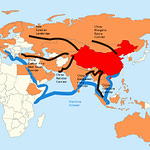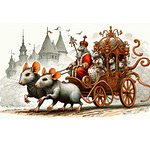(If you’re reading this in your email browser, I recommend clicking on the title to switch to reading on my Substack (https://juliusruechel.substack.com) because most email programs truncate larger image-rich Substack posts.)
“Men, it has been well said, think in herds; it will be seen that they go mad in herds, while they only recover their senses slowly, and one by one.”
― Charles MacKay, Extraordinary Popular Delusions and the Madness of Crowds (1841)
As society continues to unravel into chaos and dysfunction, it has become amply clear that we are surrounded by a horde of people upon whom evidence and rational debate has no effect.
A lot of ink has been spilled to explain what has gone wrong in society to make people so prone to falling for all the lies and groupthink, why they’ve become so resistant to new evidence, and why their moral compass has been discarded. As many people have commented, “society has gone insane”, people have been infected by a “mind virus” or, as one friend likes to say, “people are not even human anymore.” In other words, what has happened to break people’s minds?
In Part One of this Deep Dive into the unravelling of Western Civilization, I’m going to tease apart the psychological origins of our decline as all the civilizing forces that once kept our feral human nature in check are now breaking down.
In Part Two — Brain Games — I will explore the strange ways in which our brains work, which, when overlaid on the emergent political, institutional, and social crises, explains many of the bizarre behaviours that are boiling out of society.
And in Part Three — A People Unfit for Democracy — I will explore the social cycles that have haunted humanity since the dawn of time as different forms of government rise, grow stale, and get replaced by the next stage in the cycle — and the implications for our own era as our corrupted democracies teeter on the brink of exhaustion.
~ ~ ~
One of the most compelling explanations offered during the Covid era came from Belgian professor of clinical psychology, Mattias Desmet. In his book, The Psychology of Totalitarianism, he laid out four psychological conditions to explain why society — allegedly — becomes vulnerable to mass hysteria and willing to surrender its freedoms to some cause, leader, or government:
1) a lack of societal bonding (i.e. loneliness, lack of community),
2) a sense that lives have no meaning or purpose (i.e. sleeping walking through dead-end jobs),
3) free floating anxiety (i.e. a persistent sense of foreboding about the future not tied directly to any specific situation or object, recognizable in modern society by skyrocketing levels of depression and an unprecedented mental health crisis),
4) and chronically high levels of frustration and aggression in everyday life.
By this tidy explanation, societal conditions created a perfect storm of psychological pressures to break people’s minds and turn once-functional human beings into a rabid easily controllable mob.
It’s easy to find evidence that seems to support that theory — financial stress, the rise of corporatism, over-taxation and over-regulation, cultural erosion, mass migration, post-nationalism, nonstop fearmongering propaganda about everything from viruses to climate change to the Bad Orange Man, the caustic influence of feminism, the seductive lure of socialism, the breakdown of the family structure, the decline of religion, poor quality education, overcrowding in cities, and so on and so forth.
However, science doesn’t progress by finding evidence for a compelling theory, but rather by putting that theory to the test by searching for evidence to try to disprove it. It doesn’t matter how much evidence you accumulate to support an idea, it only takes a single piece of counterevidence to blow that theory apart.
Desmet’s explanation rests on the unspoken assumption that rational, logical, evidence-based functioning minds have been broken by current societal conditions. And yet, merely writing that last sentence injects the first whisper of doubt because anyone who has ever observed any member of our human species in its natural habitat is keenly aware that humans are a permanent bundle of irrational emotions, inconsistent thought processes, vicious tribalism, and mob behaviours. Our flawed human nature is perhaps the only thing you can count on to remain unchanged throughout history.
History is one long never-ending stream of moral panics, mob psychology, groupthink, social contagion, mass hysteria, popular delusions, superstitions, tribal hatreds, and the attraction to ideological crusades and strongmen. Even the so-called “golden eras” when society was stable and strongly rooted in its culture were no less prone to these impulses as some madness could erupt spontaneously, seemingly out of nowhere, and at any moment. From the Salem witch trials, to the tulip mania during the Dutch Golden Age (17th century Holland), to modern stock market bubbles, to the “Satanic day care panic” of the 1980s, the “Tickle Me Elmo” craze in the late 90s, to lynch mobs, to pogroms, and even to ridiculous fashion trends, the examples of moral panics, mob psychology, and wholly irrational societal obsessions are endless. It’s who we are as a species.

So, the idea that societal conditions broke people’s minds falls flat when we face up to the fact that people’s minds are, even at the best of times, anything but sane, logical, and rooted in evidence-based thinking. There has always been an irrational, vindictive, and ignorant mob — if anything, the only real and much simpler question is ‘why did the irrational mob become focused on the current set of destructive ideas instead of something else?’
Even the scientific community, which supposedly dedicates its life to evidence-based research and evidence-based debate, has proven time and time again that it is no less prone to succumbing to endless mad and destructive fallacies that spread like wildfire throughout the scientific community (and beyond) even when the evidence should have changed minds long ago, like the Martian Canals theory that persisted into the 20th century long after better quality telescopes had been invented, miasma theory, eugenics, Lamarckism, the recently-debunked 60-year panic about dietary cholesterol causing heart disease, the now-discredited 19th-century climate theory that the “rain follows the plow” (which I wrote about in my book, Plunderers of the Earth), or the ongoing climate hysteria of today.
Tenured academia — the supposed bastion of rational thought — is also ironically where the ideas and support for most authoritarian social engineering projects usually originate.
And once these ideas take root, they are shockingly resistant to evidence and logic.
The tribalism that erupts inside the scientific community as the “consensus” closes ranks against dissident voices is also no less feral in its consequences — a particularly famous example is what happened to Professor Ignaz Semmelweis in the late 19th century, in the era before germ theory, when he noticed that doctors were killing women during childbirth by not washing their hands in between dissecting corpses and delivering babies. He proposed the controversial idea that doctors should wash their hands after conducting autopsies and before going to the delivery room, for which he was viciously vilified, ostracised, and ultimately committed to a mental asylum against his will by his own colleagues, where he was beaten up by the guards and died from a gangrenous wound that resulted from the beating.*
It would seem that much of our thought processes — even at the best of times, even among those whose entire careers are dedicated to evidence-based thinking, and even in social classes that don’t fit any of Desmet’s criteria — are no less governed by emotions, ego, tribal allegiances, self-interest, prejudice, and peer pressure, rather than by rational evidence-based thought as we would like to believe. It doesn’t take any of Desmet’s four criteria to turn supposedly reasonable, rational, logical men into feral mobs willing to follow their leaders over a cliff.
Civilization is not the natural state of human affairs. It is the product of a slow, difficult, tedious cultural and institutional evolution, which tempers our raw emotions and keeps our destructive human nature at bay. And so, as we try to understand what has gone wrong in society, we have cause-and-effect reversed — civilization is not breaking down because we’ve lost our minds; it’s the opposite — as the civilizing forces that restrain our feral natural instincts are corrupted and fall away, we are being revealed for who we really are — feral, mean, vicious, superstitious, emotional, self-serving, and tribal — and the more that the guardrails of our civilization erode away, the easier it is for our ugly nature to be unleashed, by accident and/or by intentional design.
Look outside of modern Western society — the belief that we are normally creatures rooted in restraint, logic, rationality, and evidence-based thinking in the absence of Desmet’s psychological criteria is equally betrayed by overwhelming evidence of our never-ending superstition, raw tribalism, impulsiveness, and feral emotions, despite the fact that these societies also don’t feature any of the usual scapegoats that are blamed for the unravelling of the West (financial stress, corporatism, feminism, taxation, mass migration, family breakdown, loss of religion, overcrowding, etc.).
Civilization places institutional and cultural guardrails upon our thoughts and actions — and when those guardrails break down, we revert to the mean. We don’t need psychological pressures to turn ourselves into feral beasts. It’s actually the other way round — we need civilizing psychological pressures to prevent us from turning into feral beasts. Any society that turns its back on the principles upon which its civilization was built will rapidly unravel into some version of the Lord of the Flies.
You don’t have to look far for examples of human nature in its raw, irrational, superstitious, tribal, default forms outside of the confines of Western Civilization, whether it’s the tribal wars raging today in South Sudan among pastoralist tribes; the “witches” that are still being burned in parts of rural India today (with over 2,500 of them having been burned between 2000 and 2016); or the centuries-old, anti-civilizational tribal bloodlusts and honor-killings that are so commonplace from Afghanistan to Palestine and beyond.
Perhaps the best historic example to illustrate my point is the Xhosa cattle-killing movement of 1856-1857 in South Africa that sprang up seemingly out of nowhere as the complex pastoral Xhosa society suddenly became obsessed with a silly prophecy made by a local girl that if they killed all their cattle, their ancestors would all rise from the dead to help them drive out the British — after slaughtering over 400,000 of their own cattle and triggering a famine that wiped out 40% of the Xhosa population, the remaining survivors who didn’t flee the region to escape the Xhosa death spiral were all rounded up and forced to labour for the British — you couldn’t find a better example of an entire culture, faced with some kind of outside pressure, which responded by suddenly throwing itself over a cliff based on some random superstition that was seized upon and fanned by the influential members of their society.
In other words, even outside of modern societal pressures and within societies that are firmly rooted in their culture, religion, and way of life (i.e. in cultures that don’t meet any of Desmet’s criteria), our brains are forever doomed to be fertile ground for superstition, hysteria, and tribalism — and ripe for conspiratorial manipulation by those who capitalize on our irrational human nature for power or profit.
Our supposedly “broken” minds today are functioning exactly as they always have. Our minds are not “broken” — it’s the guardrails of civilization that are broken. And so, as will become increasingly clear as this essay progresses, the solutions to this are far more complex than to simply show individuals more compelling evidence, give individuals more counselling, lecture society about its moral failings, communicate more “authentically”, or encourage individuals to reconnect with their spirituality, as so many others have suggested.
You can’t “red pill” society out of this madness. Until we rebuild the guardrails of civilization (the institutions, culture, etc.) that once restrained the feral human nature of the masses, society will remain trapped in its current death spiral. Until we rebuild the civilizing forces that exist between individuals and which act as filters for our behaviour and thought processes, our politicians, media, activists, lobbyists, and countless charlatans of all sorts will continue to be able to easily hijack our irrational human nature so that the mob will continue to be just one carefully-massaged news story or carefully-crafted social media campaign message away from the next descent into madness.
If anything, as our culture and institutions continue to unravel, the mind viruses are only likely to get worse. Even if individual follies fade (like the Covid mandates), without healthy functioning civilizing guardrails, they are virtually guaranteed to be immediately followed by new ones that are every bit as destructive as the last ones.
Rescuing individuals from their irrational beliefs on some single issue (like Covid) will not return society as a whole back to sanity.
Look at how many people who didn’t fall for the government- and media-promoted Covid propaganda have nonetheless become captured by completely different irrational and unsubstantiated narratives for which there is no credible evidence. Without well-functioning institutions, society becomes putty in the hands of spin doctors on all sides, and countless narratives begin to flourish purely because they sound plausible or because someone has taken the time to cherry-pick enough evidence to support an idea while ignoring everything else that prove that theory wrong.
For example, consider how many Covid dissidents have nonetheless fallen for the “chemtrails” conspiracy theory, or became firmly convinced that there were microchips embedded in the Covid vaccines despite a complete lack of evidence to support this idea.
Likewise, there was a flourishing of the conspiratorial idea that mind control can be achieved via 5G radiation. There’s also been a massive flourishing of the pseudo-legal beliefs promoted by the sovereign citizen movement. And millions of Covid-era dissidents have also been captured by Trump Derangement Syndrome or have gotten caught up in the massive wave of antisemitism that’s currently sweeping across the world.
And look at how many Covid dissidents have unquestioning embraced the belief that Russia’s invasion of the Ukraine was “unprovoked”. And in Canada, where a recently as three years ago Covid dissidents were being arrested for the crime of flying the Canadian flag (which the politicians and media had rebranded as a hate symbol), many of the same people who kept a clear perspective at that time have now been infected by the tribal patriotism for the “elbows up” dollar-for-dollar trade war between Canada and its ten-times larger neighbor.
Without healthy institutional processes and cultural restraints to help us filter the incomplete information that’s permanently flooding towards us and expose the lies behind the propaganda, immunity to one mind virus doesn’t automatically provide immunity to the next.
In reality, to bring sanity back to individuals, civilization has to be rebuilt first. Superstition, irrationality, tribalism, and all the other feral behaviour we see today — on all sides — will only begin to fade after the guardrails of civilization are restored. Until then, we will continue to bounce from one madness to another as one absurd idea becomes stale and is replaced by some new obsession that is equally resistant to evidence.
And the mind viruses that will persist the longest are those that are intentionally fanned by politics, media, and other bad actors with their own agendas, irregardless of whether they are the original source for those ideas or merely capitalizing upon whatever madness is currently in vogue within society.
In short, any theory of mind that assumes that something has happened to “break” individuals is simply wrong. The question has to be reframed. It’s not “what broke people’s minds?”, but rather “what changed in society to break the guardrails that normally keep those naturally destructive emotions, tribal instincts, and irrational behaviours from completely overwhelming and crippling society?”
If we misdiagnose this to conclude that people’s minds have been broken and that it’s the people that need to be fixed, we’ll be trying to fix something that isn’t broken. The patient on our operating table is not the Individual, but Society as a whole — the institutions, the culture, the family, the community, and all the other anchors that shape human behaviour and restrain our feral human nature.
And that’s where this story begins to get complicated.
~ ~ ~
To Every Thing There Is a Season
Although it is true that people are basically emotional, irrational, tribal, superstitious, and impulsive nearly all the time so that some madness can erupt in society, seemingly out of nowhere and at any time, it is also true that there are periods in history when society as a whole acts more insane than at other times, that there are periods when the madness gets more deadly and destructive, and that these stampedes into wholesale society-wide total madness seem to come in cyclical waves that map out across the span of generations.
This cyclical nature of civilization is so deeply ingrained in history that it is even captured by some of the oldest fables and myths across almost all cultures, from the ancient Greeks, to Hindu mythology, to the Norse, to the Aztecs, and beyond.
For example, the ancient Greek myth of the Phoenix tells of an immortal bird that cyclically regenerates by setting itself on fire, only to be reborn from its own ashes. Or the story of the Greek god Chronos (known as Saturn to the Romans) being overthrown by his own son after the “golden age” of Greek mythology unravelled into tyranny under his rule, which I described in more detail in my recent article Why Conservatism Failed to Stop a World Gone Mad.
Mirroring these myths, philosophers, social scientists, and historians have also described how the course of civilization follows this cyclical pattern. Among the earliest writers who documented this cyclical pattern are the ancient Greek philosophers like Plato, Aristotle, and Polybius, whose insights about this multi-generational social cycle predate more modern philosophers by a few millennia. In the Arab world, Ibn Khaldun wrote about the cyclical nature of civilization in the 14th century. In Italy, Niccolò Machiavelli wrote about it in the 16th century. And in our own era there are countless names like Arnold J. Toynbee, George Modelski, Nikolai Kondratiev, Will Durant, George Friedman, and many others who have all described this cyclical pattern to history as society alternates back and forth between order and chaos.
Perhaps the most well-known recent book that describes this cyclical pattern is The Fourth Turning by William Strauss and Neil Howe — Al Gore (yes, that Al Gore) described their book as ‘the most inspirational book on American history that he’s ever read’ and gifted a copy to every member of Congress, while Wikipedia points out that President Trump’s former chief strategist Steve Bannon is "very familiar with Strauss and Howe's theory of crisis, and has been thinking about how to use it to achieve particular goals for quite a while."*
The cyclical pattern of history is evident, but the explanations, despite their popularity, are once again suspect.
William Strauss and Neil Howe tried to explain the phenomenon through individual psychology based on the idea that each generation shapes the psychology of the generation that follows, producing a four-generation repeating cycle to history based on the unique psychological traits of each generation — in the “fourth turning” (crisis period) the stars align for a perfect storm when an ideological generation of elders (i.e. Boomers) pushes to try to transform society, and does so by harnessing an obedient generation of would-be heroes (Millennials) to fight their wars and obediently translate their vision into reality.
It’s all tremendously compelling and a thoroughly entertaining read. And yet, the moment you try to project this theory onto the history of other societies around the world, from Europe to the Middle East to Africa to Asia, the cycle falls apart because they don’t follow the same pattern. So, either human psychology in America is completely unique compared to how intergenerational psychology plays out in the rest of the world (not likely), or perhaps, once again, the reasons behind this cyclical pattern to history lie elsewhere, not in the minds of individuals but in the natural evolution of society and its institutions.
One of the most common mistakes made in academic research is to recognize patterns where they do not actually exist. Instead of searching for opaque patterns in individual psychology to explain society’s periodic unravelling into madness, a much simpler explanation comes from the idea that society is periodically plunged into crisis and painful renewal because the ideas, incentives, institutions, and core assumptions of each era are gradually exhausted over time, which leads society into a destabilizing crisis.
To take but one example, free trade in the post-WWII era began as a positive force to uplift poor countries that had either been languishing in isolationist protectionism or had been destroyed by war. Yet over time, free trade in its current form has evolved into a destructive force as home economies are hollowed out and foreign economies are wholly re-tooled to serve ruthless corporations that scour the globe for the lowest labour costs and lowest environmental standards. Combine that with the loss of local autonomy as “democracy” continues to centralize power in ever more distant hands, and you have the perfect recipe for local communities to be plunged into economic chaos with no way to defend themselves. And so, as the economic foundations of society begin to unravel, the social fabric begins to unravel as well, which provides fertile ground for our tribal, superstitious, and self-serving human nature to start cooking up all sorts of madness.
As I discussed in my recent article, Why Conservatism Failed to Stop a World Gone Mad, all the core pillars of the post-WWII era are exhausted. Institutions have become utterly corrupted over time as people figured how to hack them for their own self-serving interests. Our mountains of debt, at all levels of society, have become wholly unsustainable and serve as a kind of new-and-improved feudal yoke. Regulation has grown so exhaustive that it is strangling society at every level. Democracy has devolved into mob rule. Free trade is hollowing out both developed and developing economies. And our tight-knit “international community” has become the perfect breeding ground for GroupThink among our elites.
Cultural identity has been hollowed out by post-nationalism and mass migration. The rich interconnectedness of local communities has been hollowed out by the transience of the modern job market. The welfare state has eroded personal responsibility. Feminism has destroyed time-honored gender roles both at home and in the workplace. And a combination of factors have destroyed the traditional support structures of multi-generational families.
The proliferation of multi-lateral institutions and international treaties have gutted local autonomy, local decision-making, and national sovereignty. And everyone, from independent philanthropist-investors and corporations all the way up to entire nations, has figured out how to use the international institutions of the post-WWII era as a means to plunder one another. In other words, all across Western Civilization, the system itself is in crisis — and the people are merely reacting to the perverse and contradictory incentives of that broken system.
As I explained in my last article, The Strong Do What They Can and the Weak Suffer What They Must, even the idea that history could be tamed by entangling Western Civilization in a maze of treaties, alliances, and international institutions is now also breaking down as America wakes up to the reality that those treaties, alliances, and international institutions have been weaponized by its weaker allies to take advantage of America. As those long-ignored frictions between nations finally erupt into the open, the world is once again on the path to conflict and war.
In other words, as the ideas underpinning the post-WWII era are all exhausted, this inevitably leads to an unravelling of the political, institutional, legal, economic, and social fabric of civilization — the very guardrails that once kept irrational, superstitious, and tribal individuals from behaving like feral beasts. As all these layers of civilization are simultaneously plunged into crisis, with no obvious solutions, and as most of society is still firmly committed to defending the defunct ideas of the exhausted post-WWII era, this has created an ecosystem in which society (the herd) is now lost, directionless, anchorless, and uncertain how to navigate the future — which creates the perfect breeding ground for groupthink, superstition, tribalism, and emotional thinking to be unleashed in its rawest, most uncivilized form.
And as our tribal, superstitious, irrational, and emotional human nature reacts to this escalating crisis, we have all the conditions for a perfect death spiral of ever-growing self-inflicted chaos and irrational beliefs, except that instead of killing our cattle like the Xhosa did (although the climate crusade seems increasingly fixated on demonizing livestock as well), we are systematically destroying all the remaining pillars of our civilization. The exhausted Phoenix has set itself on fire once again.
~ ~ ~
In the upcoming Part Two of this essay, I will dive into some of the strange ways in which our human minds work, which, when overlaid on the current political, institutional, and social crises, explain many of the bizarre behaviours that are boiling out of society. The list is by no means exhaustive but nonetheless demystifies much of the madness.
Make sure you subscribe to my Substack so you don’t miss it!
I want to thank all my paid subscribers for your support. It means the world to me!
If you are not already a paid subscriber, I’d like to ask for your support in the form of a paid subscription to my Substack. These essays require a colossal amount of time, effort, and research to produce. My liberty to tackle topics that others cannot comes from the fact that I am not sponsored by any think tank, media outlet, or political organization. I am 100% reader-supported by people like you.
But if you’re not ready to sign up for a paid subscription quite yet, perhaps you’d consider leaving me a tip in the Tip Jar on my website to help support my writing.
See you in Part Two!
















Share this post